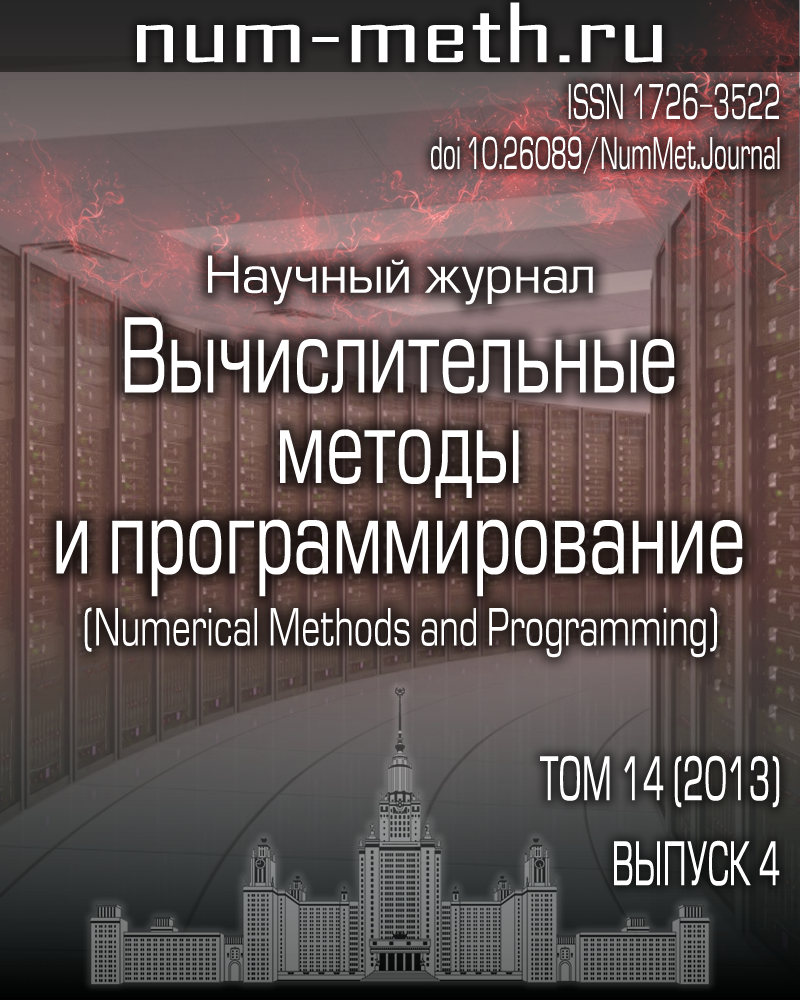Модели и методы профилирования и оценки времени выполнения потоков работ в суперкомпьютерных системах
Ключевые слова:
Аннотация
Решение сложных инженерно-научных задач на распределенных и суперкомпьютерных вычислительных системах часто может быть эффективно реализовано посредством организации потоков работ, объединяющих отдельные программные компоненты (генераторы сеток, решатели, визуализаторы, системы многокритериальной оптимизации и др.) для решения конечной задачи. Для оптимизации загрузки таких платформ применяются методы распознавания структуры приложений на основе модели потоков работ, а также методы формирования их профилей и оценки времени их исполнения на выделенных вычислительных ресурсах. Приводится обзор существующих методов генерации интеллектуального профилирования и оценки времени выполнения потоков работ. Предлагается новая математическая модель представления задания в виде размеченного взвешенного ориентированного ациклического графа. Рассматривается проблема кластеризации графа задания и его отображения на вычислительную среду. Работа выполнена при финансовой поддержке Минобрнауки РФ (государственный контракт № 14.514.11.4106) в рамках ФЦП «Исследования и разработки по приоритетным направлениям развития научно-технологического комплекса России на 2007–2013 годы.
Библиографические ссылки
- Кнут Д.Э. Искусство программирования. 1. Основные алгоритмы. М.: Издательский дом «Вильямс», 2000.
- Blythe J. et al. The Role of Planning in Grid Computing // Proc. 13th International Conference on Automated Planning &; Scheduling. Menlo Park: AAAI Press, 2003. 154-163.
- Chtepen M. et al. Online execution time prediction for computationally intensive applications with periodic progress updates // J. of Supercomputing. 2012. 62, N 2. 768-786.
- Devarakonda M.V., Iyer R.K. Predictability of process resource usage: a measurement-based study of UNIX // IEEE Trans. on Software Engineering. 1989. 15. 1579-1586.
- Foster I. et al. Chimera: a virtual data system for representing, querying, and automating data derivation // Proc. 14th International Conference on Scientific and Statistical Database Management. New York: IEEE Press, 2002. 37-46.
- Gerasoulis A., Yang T. A comparison of clustering heuristics for scheduling directed acyclic graphs on multiprocessors // J. of Parallel and Distributed Computing. 1992. 16, N 4. 276-291.
- Hey T., Papay J. Performance engineering, PSEs and the GRID // Scientific Programming. 2002. 10, N 1. 3-17.
- Ilghami O., Nau D.S. A general approach to synthesize problem-specific planners. Technical Report CS-TR-4597. College Park: Univ. of Maryland, 2004.
- Iverson M.A., Ozguner F., Potter L.C. Statistical prediction of task execution times through analytic benchmarking for scheduling in a heterogeneous environment // Proc. Eighth Heterogeneous Computing Workshop (HCW’99). New York: IEEE Press, 1999. 99-111.
- Kerbyson D.J., Wasserman H.J., Hoisie A. Exploring advanced architectures using performance prediction // International Workshop on Innovative Architecture for Future Generation High Performance Processors and Systems. New York: IEEE Press, 2002. 27-37.
- Litke A. et al. Computational workload prediction for grid oriented industrial applications: the case of 3D-image rendering // CCGrid 2005. IEEE International Symposium on Cluster Computing and the Grid. New York: IEEE Press, 2005. 962-969.
- Mandal A. et al. Scheduling strategies for mapping application workflows onto the grid // HPDC-14. Proc. 14th IEEE International Symposium on High Performance Distributed Computing. New York: IEEE Press, 2005. 125-134.
- Nadeem F., Fahringer T. Using templates to predict execution time of scientific workflow applications in the grid // Proc 9th IEEE/ACM International Symposium on Cluster Computing and the Grid. New York: IEEE Press, 2009. 316-323.
- Rodriguez-Moreno M.D. et al. Integrating planning and scheduling in workflow domains // Expert Systems with Applications. 2007. 33, N 2. 389-406.
- Rodriguez-Moreno M.D. et al. IPSS: a hybrid approach to planning and scheduling integration // IEEE Trans. on Knowledge and Data Engineering. 2006. 18, N 12. 1681-1695.
- Topcuoglu H., Hariri S., Society I.C. Performance-effective and low-complexity // IEEE Trans. on Parallel and Distributed Systems. 2002. 13, N 3. 260-274.
- Vraalsen F. et al. Performance contracts: predicting and monitoring grid application behavior // Lecture Notes in Computer Science. Vol. 2242. Berlin: Springer, 2001. 154-165.
- Wu Q., Datla V.V. On performance modeling and prediction in support of scientific workflow optimization // Proc. IEEE World Congress on Services. New York: IEEE Press, 2011. 161-168.
- Zhang J. et al. Task mapper and application-aware virtual machine scheduler oriented for parallel computing // J. of Zhejiang University SCIENCE C. 2012. 13, N 3. 155-177.


